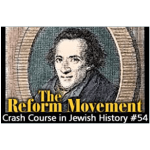History Crash Course #15: The Time of the Judges
Jewish guidance came from the “judges,” who were both warriors and prophets.
The Talmud calls the Book of Judges, “the Book of the Straight.”
Why?
Because the ultimate goal of every Jew is to use his free will to work out what is wrong and right, using the Torah as a guide. And this is what happens in the Time of Judges.
In those days, there was no king in Israel, everyone did what was right in his eyes. (Judges 21:25)
You might think that this verse sounds like a description of anarchy. But there was no anarchy; the vast majority of Jews were totally dedicated to Torah and were making decisions in the right way, and didn’t need someone tell them what to do. Indeed, that is the ideal situation. The tribes functioned as a loose confederation of states with strong central leadership arising only when the nation was threatened by an external enemy.
Of course, the lack of central authority following the death of Joshua did have negative consequence; a small minority, took it as a license to slip into idolatry and immorality. This happened largely because the Jews did not get rid of all of the Canaanites, as they were commanded to do, and the Canaanite pagan influence was felt.
Whenever the Jews abandon God, the repercussions are immediate:
And they forsook the God of their fathers and they went after other gods. And the anger of the Lord was kindled against Israel and He delivered them into the hands of spoilers and he gave them over to the hands of their enemies. (Judges 2:8-14)
This is one of the most important and oft repeated patterns we have to understand in how Jewish history works. When the Jews betray their covenant with God, bad things happen ― usually, an enemy comes and attacks.
The covenant with God doesn’t just cover the behavior of man toward God; it also includes the commandments mandating the behavior of man toward man. But both are a must.
Heed The Warning
God says over and over again ― keep the Torah, all facets of it and no one will bother you. You will live in peace in your land. You will prosper, and not only that, the whole world will come to learn from you and you will be a light to the nations.
But if you don’t, a big fist will not come out of heaven and swat you, because God acts in history. What will happen instead is a physical enemy will appear or a famine will hit the land, and all will suffer. These negative events always served as wake-up call and would only intensify if ignored until they reached the level where they were impossible to ignore.
From Mount Sinai onward the Jewish people were always aware of their covenant with God, the responsibilities it entailed the consequences of their not adhering to their side of the bargain. Because of this awareness, when calamities have befallen the Jewish people they were always viewed as symptoms of deeper problems in the Jewish people’s relationship with each other and /or with God.
When bad things happen to Jews, it is never by chance. It is always a consequence of Jewish actions, and therefore, the remedy is never to deal solely with the external threat. If an enemy attacks, defense is in order, but so is introspection; the presence of enemy is only a symptom of a deeper problem that must be dealt with. This cause and effect relationship repeats itself over and over again throughout the period of the Judges and continues throughout Jewish history until today.
We see this in the Time of Judges which extends from 1244 BCE to 879 BCE.
And the Lord raised up judges and they saved them [the Israelites] from the hands of those who had spoiled them. (Judges 2:16)
Who are the Judges?
The Judges are the Jewish leaders who arise during this time, unify the people, get them to repent, deal withthe spiritual problems of the nation, and also deal with the physical threat.
They are sometimes military leaders who know how to mobilize the nation for war against an enemy, but their real power lies in their Torah knowledge and ability to adjudicate Jewish law.
The narrative for this entire period appears in the Book of Judges, authored by the last great personality in the period of the Judges-Samuel the Prophet. The period of the Judges spans a period of 365 years from the first judge, Otniel ben Kenaz, and with the last judge, the Prophet Samuel.
During this period there were seventeen different judges. Some led the Jewish people for decades while others only for a few years. The Book of Judges goes into great detail for some of the Judges (Ehud, Deborah and Samuel) while others get only the briefest mention (Ibzan, Elon, Avdon). While all were great leaders, some where greater than others. Tradition tells us that the level of the judge depended on the collective level of the Jewish people. Every generation got the leadership it deserved. During this entire We will highlight a few of the 16 Judges described in the Bible:
Deborah
One of the first of the Judges is a woman ― Deborah. (See Judges, Chapters 4-5.) She is famous for sitting under a palm tree where anyone could seek her advice, and from where she issued battle orders.
Barak, Israel’s top warrior during that time, refuses to go into battle without her. Together they lead the troops against the much larger Canaanite force backed up by 900 iron chariots, of which Israel had none.
The Book of Judges describes a key battle with the Canaanites led by Sisera.
On the eve of the battle, Barak is doubtful that Israel’s warriors could ever beat such a strong opponent but
Deborah stands firm. An unexpected storm is unleashed in the heavens, and the resulting downpour turns the ground to mud; the iron chariots get stuck and the Canaanites panic.
Deborah’s prophecy that “This is the day on which the Lord will deliver [the Canaanite general] Sisera into your hands…” is thus fulfilled.
Samson
Samson is the Judge famous for his superhero strength, and for leading the struggle against Israel’s arch-enemy, the Philistines. (See Judges, Chapters 13-16.)
The Philistines were a seafaring people. They probably migrated from the area of the Aegean near Greece about 3,200 years ago. They settled along the eastern Mediterranean Coast from the southern coast of Israel to Lebanon. In the southern coastal area of Israel they established a confederation of five city-states (Gaza, Ahskelon, Ashdod, Gath and Ekron). During the period of the Judges they are constantly at war with the tribes of Israel pushing them away from much of the coast and into the hilly, inland regions of the country.
Excavations show that the Philistines ― despite what the word “Philistine” has come down to mean in the English language ― were very sophisticated culturally. They had perfected iron tools and iron weapons, gaining an important technological advantage over their neighbors.
Samson, who judged Israel for 20 years, was one of the people who takes on the Philistines. Samson is a Nazir. (Nazir is a form of penitence in which a person temporarily refrains from cutting his hair and abstains from wine) Samson’s Nazir status is unusual in that he is a Nazir from birth and remains one his entire life. In addition, his long hair gives him super-human strength.
To undermine the Philistines he pretends to join them by deliberately taking a Philistine woman as his wife. She is killed by her own people; he then consorts with another Philistine woman ― Delilah. This turns out to be a mistake as Sampson becomes very attached to her.
Delilah catches on that Samson is a major threat to her people. After many failed attempts and much pleading she finally succeeds in getting Samson to reveal the secret of his superhuman strength and cuts off his hair while he is asleep. As a result the Philistines are able to capture him. They then blind him and throw him in prison.
But they forget that hair grows. As his hair grew back, his superhuman strength returns.
The Philistines decides to execute Samson in a public display at the Temple of Dagan, one of their gods.
As the masses gather to watch the execution, blind Samson asks a slave boy to position him next to one of the columns supporting the temple.
At the climax of the narrative Samson prays:
“My Lord, God! Remember me and strengthen me just this one time, O God, and I will extract vengeance from the Philistines for one of my two eyes.” Samson grasped the two central pillars upon which the building rested, and he leaned on them; one with his right hand and one with his left hand. Samson said, “Let my soul die with the Philistines!” (Judges 16:28-30)
With his renewed superhuman strength he overturns the column and collapses the building killing all inside.
He dies giving his life for the Jewish people and the Bible says he killed more Philistine enemies in that moment than he vanquished the whole rest of his life.
Samuel
The last great personality of the period of the Judges is the Prophet Samuel, who is one of the most important prophets in Jewish history, and who is also famous for anointing the first two kings of Israel ― Saul and David. (See 1 Samuel, chapters 1-16.) He authored the Book of Judges and, together with the prophets Gad and Nathan, the book of Samuel.
By the time Samuel appears on the scene, the Jewish people have gone through close to 400 years of no strong central leadership. They had to live up to a very high level of individual responsibility or else God would let them know they were off course via the Canaanites or the Philistines or the Midianites. This was a very difficult way to live. In the final analysis, the nation couldn’t maintain this level of scrutiny without stronger guidance.
When Samuel was younger, he would travel the land adjudicating Jewish law and giving people advice, but now that he has grown old, he can’t do it anymore. Meanwhile, his two sons, who have taken over for him, prove unpopular with the people.
So a delegation is dispatched to ask Samuel to anoint a king instead:
And they the people said [to Samuel] “Behold, you have grown old and your sons do not walk in your ways. Now set up for us a king to judge us like all the nations. And the thing was displeasing in the eyes of Samuel…” (1 Samuel, 8:5-7)
Samuel doesn’t want to do it, but God tells him to go ahead and find a king for the people.
And this is how the Time of Judges comes to a close. Samuel functions as a leader for 13 years and the last of two years he actually co-leads the Jewish people with the first Jewish king whose name is Saul.










